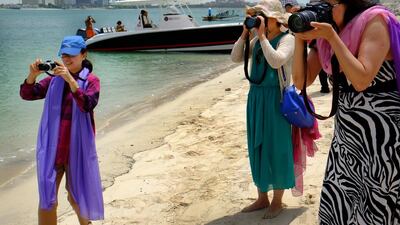The other day I was asked to talk to an American freelance reporter who was working on an article about travel tips for women visiting the Emirates. I agreed, in part because I remembered my first morning in Abu Dhabi, when I had to find a cab and get to an early-morning school tour. In my jet-lagged haze, I wandered out to the street, not sure where I was going or whether a taxi would stop for me. I didn’t feel unsafe – it was broad daylight, after all – but as I tried to flag down a taxi, I felt noticed in a way that I never did on the streets of New York. The scrutiny unsettled me: what was I doing to draw attention? Now, five years later, I know that in all likelihood it wasn’t my stunning beauty that caused the looks but just the fact that I was a western woman hailing a taxi.
When the reporter and I couldn’t catch up on the phone, she sent me her list of “tips” via email so that I could offer my comments. Some of the tips were quite sensible: always have a long shawl handy, for instance, although most of the women I know carry a shawl less for modesty and more for shelter against relentless air conditioning. The reporter’s list suggested learning the emergency number – 999, in our case – which also makes sense.
As the list went on, however, the tips seemed less sensible: she suggests that you should not embrace locals to thank them for service, for instance. That made me wonder: in what city in the world is it considered appropriate to hug one’s waiter, or the tour guide, or the hotel valet? Under what circumstances might you be tempted to do such a thing and then be thankful that someone had the foresight to tell you that such an embrace would be a faux pas? The list also recommended that women should never walk at night, always have a taxi or car waiting for them when they leave a building, always wear dark colours, and if possible, travel with a man.
The list seemed full of fear, and, in fact, the reporter said that she and a female friend had some bad experiences on their recent holiday here – several incidents of men behaving badly, a beach club that wouldn’t rent the two women a shared sun lounger – and those experiences fuelled this list.
Let’s collectively shake our finger at the boors who gave this reporter the idea that men behaving badly is the norm here. If the reporter’s article gets published, it will reinforce the stereotype, so pervasive in the West, that women in “Arabia” are all badly treated.
Women who live here know the reality, however: as a woman, it’s possible to be treated badly anywhere in the world. It would be oddly comforting if I could say that only in the UAE do men behave badly towards women but alas, misogynistic behaviour transcends all cultural and geographic boundaries. Almost every woman I know has at least one story of a time when she was made to feel uncomfortable – or worse – because of her gender. It stuns me that even now, well into the 21st century, it is still difficult for a woman to travel alone, walk alone, or dine alone in a restaurant, without a man assuming that she wants his commentary or his uninvited company. I know many wonderful men but the fact remains that sometimes a woman just wants to enjoy her dinner in solitary splendour, without any comments about her body or why you think she’s being rude in refusing your invitation to join her.
Somewhat ironically, given the stereotypes, I’ve had fewer gender-related problems here than I have had elsewhere. That fact may be in part due to issues of class and ethnicity, but it is nevertheless the case that I have never worried for my safety walking around Abu Dhabi at night. So if you’re a woman considering a trip to Abu Dhabi, please join us. If you bring a long scarf and don’t hug the waiters, you’ll be fine.
Deborah Lindsay Williams is a professor of literature at NYU Abu Dhabi. She is the author of The Time Locket, a novel that she wrote as Deborah Quinn

